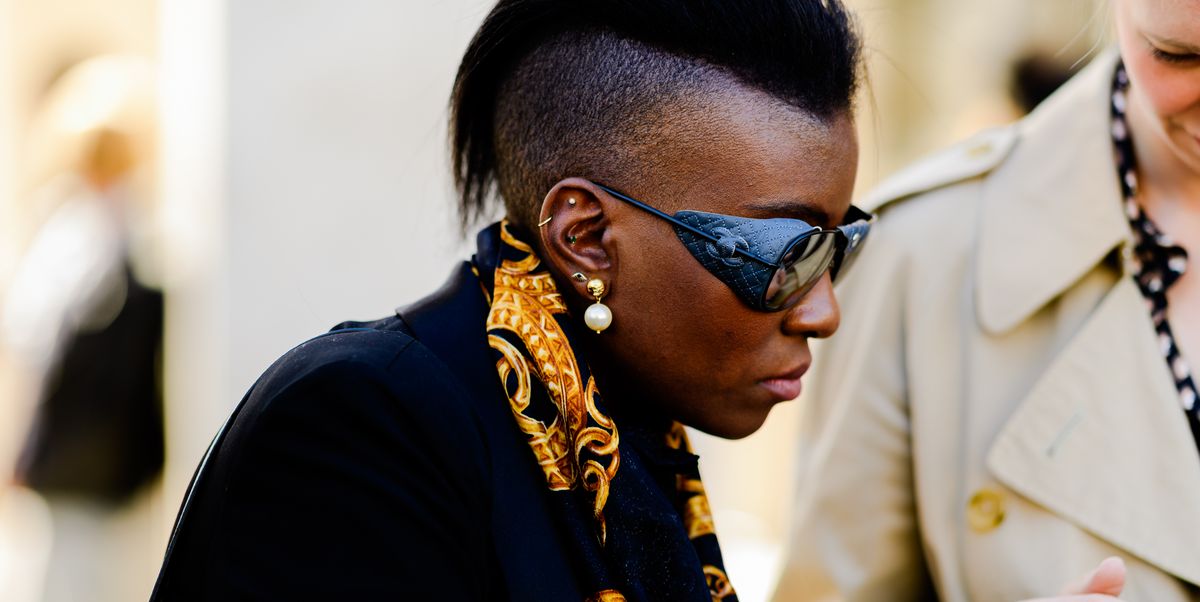

As Rihanna, FKATwigs, and ELLE.com’s very own style director Nikki Ogunnaike (pictured) can illustrate, adorning oneself with piercings remains cooler than ever, no matter your aesthetic. While they’re gorgeous and a fun way to add edge, a great collection of piercings requires certain responsibility. To debunk any myths, we asked J. Colby Smith—the preferred piercer of models, celebs, and editors alike—to give us his expert guide for pain-free aftercare, and to tell us what we might be doing wrong. (Spoiler: A lot.)
Advertisement – Continue Reading Below
As a preventative measure, ask your piercer to use a needle, not a “gun.
“The ‘gun’ forces the earring through with pressure, so it causes a lot of unnecessary damage to the tissue. It’s also hard to manage the sterilization of a tool with plastic parts,” Smith says, “With a needle, we have more control of accuracy, and it’s totally sterile. It works like a scalpel, making a small incision into the tissue, leaving minimal damage to the area. It’s also a myth that the gun hurts less—if a needle piercing is done properly, the pain is very minor.”
Be healthy.
Smith advises keeping your body hydrated. A healthy diet is always important but especially after a piercing. Also make sure to avoid additional trauma to the piercing area. As Smith says, “Most irritations occur from bumping, snagging or sleeping on new piercings.”
To care for a fresh piercing, wash with soap and water or saline solution—not rubbing alcohol—twice a day.
“I find alcohol dries the piercing out,” Smith explains, “If it gets too dry, it cracks and bleeds, causing the wound to remain open. I prefer oil-based soaps for this reason. They clean the wound, but also provide oils to soften up the healing tissue.”
Create a routine for yourself.
Before you touch your new piercing it’s best to wash your hands with soap and water. You can moisten the piercing with clean fingers and throughly clean the pierced area. After, rinse off the area with warm water.
Yes, you can “turn” the earring—but ONLY when it’s wet.
“Turn it if it’s wet and you are cleaning it. If it’s dry, do not move it,” Smith warns.
Know that a cartilage piercing will require a bit more TLC than a lobe piercing.
“Anything in the cartilage area is more temperamental during the healing process,” Smith says, “They feel about the same to receive, but can be more difficult to heal.”
Advertisement – Continue Reading Below
Keep an eye out for signs of healing—and know how long you might have to wait.
“Ear lobes usually take about two to three months to heal, and cartilage takes about three to 10 months. Once it stops hurting, swelling, and secreting fluid, and any redness disappears, it’s healed,” Smith explains.
And help things along as best you can.
“It takes a patient mentality to help piercings heal 100 percent. Your body’s job is to get rid of foreign objects, so it’s a little bit of a dance you have to do,” Smith says, “You must be patient and nurse it to health. Sometimes the simple things are the best: Soap and water to clean, and ice for the swelling. If you take your aftercare seriously, you’ll avoid any problems.”
If your piercing is bothering you, don’t panic.
“If you notice excessive swelling, redness, or radiating heat, or if the piercing is secreting fluid, don’t stress—nine out of 10 times, your piercing is only irritated and not infected,” Smith assures. “Any reputable piercer will take a look at your piercing and set your mind at ease. Never panic—worst case we just remove the jewelry. Don’t ask your friends, search online, or go to the doctor. Your piercer should be your first stop if you are the slightest bit worried, no one else.”
Be the first to comment